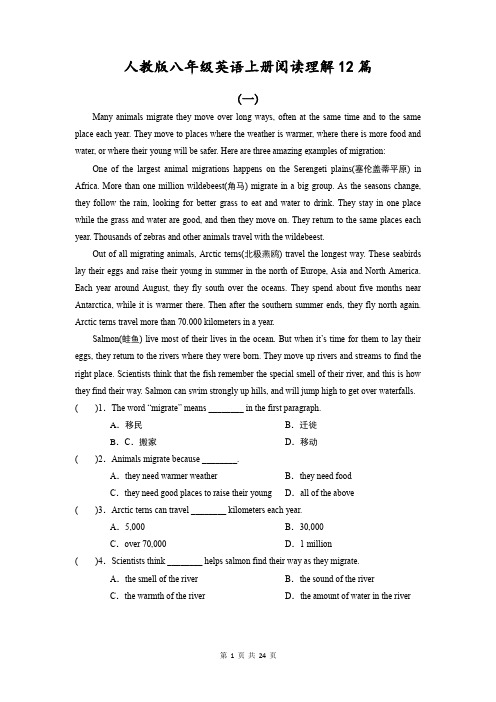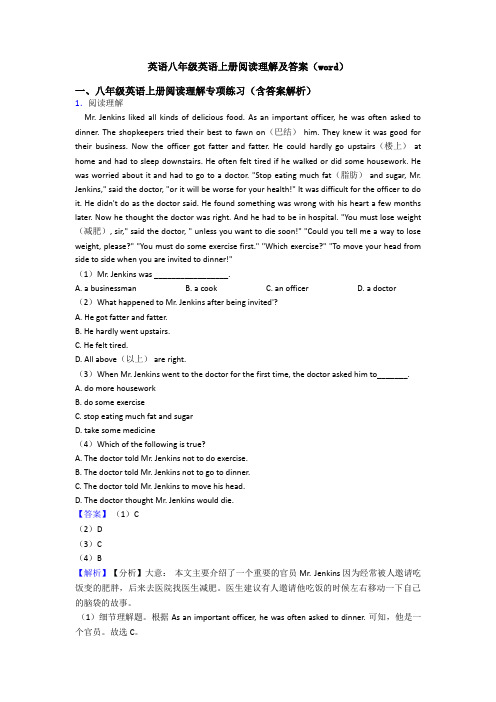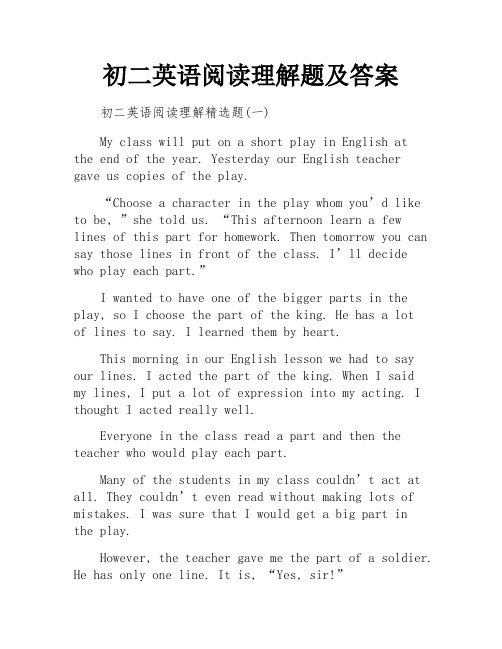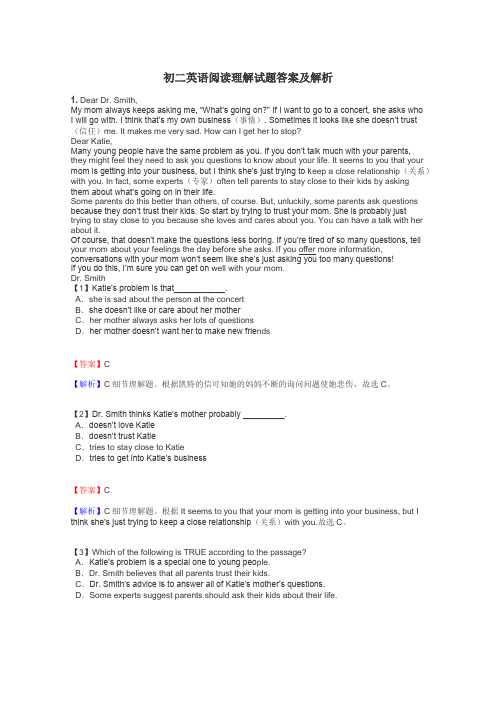八年级英语阅读理解含答案及解析
八年级英语下册阅读理解点解析(Word版附答案)经典

八年级英语下册阅读理解点解析(Word版附答案)经典一、八年级英语下册阅读理解专项练习(含答案解析)1.阅读理解If you love reading books, you must know about the book The Little Prince. It's a famous novel written by a French writer. As one of the best-selling books in history, it has been sold as many as 200 million copies in 253 languages and dialects(方言). Now, around seventy years after the birth of the book, an American director has found a way to make it into a 3-D animated film.The book tells the story of a pilot, called The Aviator, who crashes into the desert and meets a young prince there. However, in the film, the story starts years after the crash when The Aviator is much older. He has got a new neighbor called The Little Girl, whose mother wants her to get ready to enter the grown-up world. Slowly, The Aviator shares his story with The Little Girl by writing it down and sending her a page at a time. The pages are complete with the pictures in the book, speaking about his time in the desert and taking The Little Girl to an amazing world where anything is possible.China is the first country in the world to see the film in two versions(版本)—in Chinese and English. The film shows The Little Girl's life and tells The Little Prince's story at the same time in a beautiful way.Huang Lei, a famous Chinese actor, says the film is like a childhood dream which is lost by most adults in this stressed-out society."The most touching(感人的) part is that every one of us was a good-natured kid like The Little Prince, and it's a pity that this good characteristic(品质) goes away as time flies," he says. (1)The novel The Little Prince was written in the _________.A. 1900sB. 1940sC. 1990sD. 2010s(2)The book The Little Prince is one of the best sellers in history because ________.A. you must know about it if you love reading booksB. it tells the story of The Little Prince's storyC. it has been sold as many as 200 million copies in 253 languages and dialectsD. the director has made it into a 3D animated film(3)How does The Little Girl get to know the story of The Little Prince?A. She reads the pages that The Aviator writes and sends to her.B. Her mother wants her to get ready to enter the grown-up world.C. The Aviator takes her to an amazing world.D. She moves home next to The Aviator.(4)What does the underlined word "good-natured" mean?A. KindB. FriendlyC. HelpfulD. All the above(5)According to the passage, which is Huang Lei's opinion?A. He doesn't believe the good characteristic is lost as we grow older in this stressed-out society.B. He thinks all of us should keep our better nature and never let it disappear.C. He feels excited because he can see the film in two versions first.D. He and his daughter voice the film together.【答案】(1)B(2)C(3)A(4)D(5)B【解析】【分析】本文介绍了 The Little Prince 这本书。
英语八年级英语下册阅读理解及答案

英语八年级英语下册阅读理解及答案一、八年级英语下册阅读理解专项练习(含答案解析)1.阅读理解More than fifty years ago, Barbie Millicent Roberts first appeared in the world of toys. Since then, Barbie doll, as everyone called her, has become the most successful toy doll in history. Her parent, the Mattel Company, said that 90G of all American girls between 3 and 10 have at least one Barbie at home.However, Barbie is facing some trouble at present. There are many similar dolls on the market in competition with her. Another doll named Bratz, for example, came to life about sixteen years ago. She looks more like today's pop stars with heavy makeup(浓妆) and miniskirts. And her company offers more kinds of clothes.It seems that Barbie has lost her magic among older girls. "For younger girls, playing with a Barbie is much funnier. But when you get older, you want something smarter and more modern," says Vera Shepherd, a shop assistant of a toy store in New York.It is good news that on the international market, Barbie is still No. 1. Although Mattel is selling fewer Barbies in the United States these years, sales in other countries are still going up. Mattel opened its first Barbie store in Shanghai, where girls can shop, eat, drink or even become fashion designers for their own Barbies.Mattel is planning big celebrations for Barbie's 58th birthday. Fashion designers from all over the world have been called to make new dresses for Barbie. How long will Barbie stay popular in the world of toy dolls? It is hard to say, but 58 is surely not the age to retire(退休).(1)Barbie's family name is .A. RobertsB. MillicentC. ShepherdD. Bratz(2)Barbie's trouble is that .A. she wears heavy makeup and miniskirtsB. other dolls are more popular with little girlsC. other dolls are trying to beat her in the marketD. she has become less popular in the international market(3)Girls can do the following in the first Barbie store in Shanghai EXCEPT .A. going shoppingB. having foodC. drinking juiceD. taking photos(4)What's the meaning of the underlined words "fashion designers" in the passage? A. 珠宝设计师 B. 发型设计师 C. 舞台设计师 D. 时装设计师【答案】(1)A(2)C(3)D(4)D【解析】【分析】本文主要介绍了芭比娃娃的起源,以及现在的发展状况。
人教版八年级英语上册阅读理解12篇(含答案解析)

人教版八年级英语上册阅读理解12篇(一)Many animals migrate-they move over long ways, often at the same time and to the same place each year. They move to places where the weather is warmer, where there is more food and water, or where their young will be safer. Here are three amazing examples of migration: One of the largest animal migrations happens on the Serengeti plains(塞伦盖蒂平原) in Africa. More than one million wildebeest(角马) migrate in a big group. As the seasons change, they follow the rain, looking for better grass to eat and water to drink. They stay in one place while the grass and water are good, and then they move on. They return to the same places each year. Thousands of zebras and other animals travel with the wildebeest.Out of all migrating animals, Arctic terns(北极燕鸥) travel the longest way. These seabirds lay their eggs and raise their young in summer in the north of Europe, Asia and North America. Each year around August, they fly south over the oceans. They spend about five months near Antarctica, while it is warmer there. Then after the southern summer ends, they fly north again. Arctic terns travel more than 70.000 kilometers in a year.Salmon(蛙鱼) live most of their lives in the ocean. But when it’s time for them to lay their eggs, they return to the rivers where they were born. They move up rivers and streams to find the right place. Scientists think that the fish remember the special smell of their river, and this is how they find their way. Salmon can swim strongly up hills, and will jump high to get over waterfalls. ( )1.The word “migrate” means ________ in the first paragraph.A.移民B.迁徙B.C.搬家D.移动( )2.Animals migrate because ________.A.they need warmer weather B.they need foodC.they need good places to raise their young D.all of the above( )3.Arctic terns can travel ________ kilometers each year.A.5,000B.30,000C.over 70,000D.1 million( )4.Scientists think ________ helps salmon find their way as they migrate.A.the smell of the river B.the sound of the riverC.the warmth of the river D.the amount of water in the river答案详解本文介绍了角马、北极燕鸥和蛙鱼三个令人吃惊的迁徙例子。
英语八年级英语上册阅读理解及答案(word)

英语八年级英语上册阅读理解及答案(word)一、八年级英语上册阅读理解专项练习(含答案解析)1.阅读理解Mr. Jenkins liked all kinds of delicious food. As an important officer, he was often asked to dinner. The shopkeepers tried their best to fawn on(巴结)him. They knew it was good for their business. Now the officer got fatter and fatter. He could hardly go upstairs(楼上)at home and had to sleep downstairs. He often felt tired if he walked or did some housework. He was worried about it and had to go to a doctor. "Stop eating much fat(脂肪) and sugar, Mr. Jenkins," said the doctor, "or it will be worse for your health!" It was difficult for the officer to do it. He didn't do as the doctor said. He found something was wrong with his heart a few months later. Now he thought the doctor was right. And he had to be in hospital. "You must lose weight (减肥), sir," said the doctor, " unless you want to die soon!" "Could you tell me a way to lose weight, please?" "You must do some exercise first." "Which exercise?" "To move your head from side to side when you are invited to dinner!"(1)Mr. Jenkins was _________________.A. a businessmanB. a cookC. an officerD. a doctor(2)What happened to Mr. Jenkins after being invited'?A. He got fatter and fatter.B. He hardly went upstairs.C. He felt tired.D. All above(以上) are right.(3)When Mr. Jenkins went to the doctor for the first time, the doctor asked him to_______.A. do more houseworkB. do some exerciseC. stop eating much fat and sugarD. take some medicine(4)Which of the following is true?A. The doctor told Mr. Jenkins not to do exercise.B. The doctor told Mr. Jenkins not to go to dinner.C. The doctor told Mr. Jenkins to move his head.D. The doctor thought Mr. Jenkins would die.【答案】(1)C(2)D(3)C(4)B【解析】【分析】大意:本文主要介绍了一个重要的官员Mr. Jenkins因为经常被人邀请吃饭变的肥胖,后来去医院找医生减肥。
初二英语阅读理解题及答案

初二英语阅读理解题及答案初二英语阅读理解精选题(一)My class will put on a short play in English atthe end of the year. Yesterday our English teacher gave us copies of the play.“Choose a character in the play whom you’d like to be, ”she told us. “This afternoon learn a fewlines of this part for homework. Then tomorrow you can say those lines in front of the class. I’ll decide who play each part.”I wanted to have one of the bigger parts in the play, so I choose the part of the king. He has a lotof lines to say. I learned them by heart.This morning in our English lesson we had to say our lines. I acted the part of the king. When I said my lines, I put a lot of expression into my acting. I thought I acted really well.Everyone in the class read a part and then the teacher who would play each part.Many of the students in my class couldn’t act at all. They couldn’t even read without making lots of mistakes. I was sure that I would get a big part inthe play.However, the teacher gave me the part of a soldier. He has only one line. It is, “Yes, sir!”I was very disappointed. At the end of the lesson I went up to her and asked her why I had such a small part.“You put too much expression in your acting,” she said. “Good acting is not big acting. It is acting the audience can believe in.”I think I know what she means.48. What did the boy want to do in the play?A. To get an important partB. To organize the playC. To get a large acting part.D. To work the lights.49. How did the boy feel when the teacher told the class they would put on a play?A. Bored.B. Sad.C. Excited.D. Unhappy.50. Why didn’t the teacher give him the part of the kings?A. He did not act correctly.B. He did not know the lines.C. He was not handsome.D. He was too short.51. What does the underlined word “expression”in the passage mean?A. 表情B.建议C. 模仿D. 服饰初二英语阅读理解精选题答案48. C【解析】由第三段第一句I wanted to have oneof the bigger parts in the play.可知答案为C。
英语八年级英语下册阅读理解100及答案(word)

英语八年级英语下册阅读理解100及答案(word )一、八年级英语下册阅读理解专项练习(含答案解析) 1.阅读理解Fun with shadow puppet playsShadow puppet plays are an ancient form of performance. They began in Asia, but now are performed all over the world and they can be adapted (改编) to tell any kind of story. In a shadow puppet show, the puppets can't be seen. Only their shadows can be seen.How to prepare the stage A shadow puppet stage can be made by using a piece of board (木板). ●Cut out an opening from the centre of the board.●Cover the op ening with a piece of white cloth.●The puppets hide behind the white cloth. A bright light is set up behind thepuppets. When the light behind the puppets is turned on, black shadows areshown on the white cloth. When the puppets move, the shadows move.⑴ Choose a story with two or three talking characters.⑵ Draw the shape of each person or animal on a piece of black poster board. Itwill be easy to follow the lines if you draw them with a whit pencil.⑶ Use scissors to cut out the puppets carefully.⑷ Make a drinking straw (麦杆) connected to the back of each puppet.⑸ Use it to control each puppet across the stage.Have a friend read the story while you move the puppets.A. In Germany.B. In China.C. In America.D. In France.(2)Why do we need a bright light?A. To help puppet people look better.B. To make the stage interesting.C. To help make shadows.D. To show that the show has started.(3)What can be put back into the blank in the passage?A. Making shadow puppets is difficult.B. How to cut out the puppets.C. How the puppets can be seen.D. How to make shadow puppets.(4)What can we learn from the passage?A. The audience see puppets in front of the stage.B. Shadows move as people move on the white cloth.C. People use straws to operate the puppets.D. Shadow puppet plays began in Africa.【答案】 (1)B(2)C(3)D(4)C【解析】【分析】本文主要讲述了皮影的起源,皮影的准备和制造方法。
初二英语阅读理解试题答案及解析

初二英语阅读理解试题答案及解析1. Dear Dr. Smith,My mom always keeps asking me, “What’s going on?” If I want to go to a concert, she asks who I will go with. I think that’s my own business(事情). Sometimes it looks like she doesn’t trust (信任)me. It makes me very sad. How can I get her to stop?Dear Katie,M any young people have the same problem as you. If you don’t talk much with your parents,they might feel they need to ask you questions to know about your life. It seems to you that your mom is getting into your business, but I think she’s just trying to k eep a close relationship(关系)with you. In fact, some experts(专家)often tell parents to stay close to their kids by asking them about what’s going on in their life.Some parents do this better than others, of course. But, unluckily, some parents ask questions because they don’t trust their kids. So start by trying to trust your mom. She is probably just trying to stay close to you because she loves and cares about you. You can have a talk with her about it.Of course, that doesn’t make the questions less boring. If you’re tired of so many questions, tell your mom about your feelings the day before she asks. If you offer more information, conversations with your mom won’t seem like she’s just asking you too many questions!If you do this, I’m sure you can get on well with your mom.Dr. Smith【1】Katie’s problem is that___________.A.she is sad about the person at the concertB.she doesn’t like or care about her motherC.her mother always asks her lots of questionsD.her mother doesn’t want her to make new frie nds【答案】C【解析】C细节理解题。
英语八年级英语上册阅读理解经典

英语八年级英语上册阅读理解经典一、八年级英语上册阅读理解专项练习(含答案解析)1.阅读理解A few years ago, Masaru Ibuka, the head of Sony, was at a company planning meeting. Suddenly he had an idea. He stopped the meeting an asked everyone what would happen if Sony took away the recording function and speakers and sold headphones with a tape player instead. Almost everyone thought he was silly. However Ibuka kept his idea and worked at it. The result, of course, turned out to be the successful Sony Walkman.Good ideas often start with a really silly question. Bill Bowerman was making breakfast one day. As he stood there making cakes for his son, he asked himself what would happen if he put rubber into his mold(模具) Later, he tried it and the result was something like the bottom of most sports shoes we see today. Still, when he took his idea to several shoe companies, he was laughed at. In fact, every single company turned him down. Though rather disappointed, Bowerman went on to form his own company, making NIKE sports shoes.We know today, of course, that each of these ideas caused a successful thing that has changed the way many of us live. The best questions are usually open-ended and are often silly. Children aren't afraid to ask such questions, but adults usually are. Think how different the world might be if people never asked "silly" questions!(1)At first, almost everyone thought Masaru's idea was _______.A. goodB. easyC. sillyD. difficult(2)Bill Bowerman got his idea _______.A. at a meetingB. while he was making breakfastC. from another companyD. while he was making sports shoes(3)What might the underlined phrase "turn down" mean?A. refuseB. welcomeC. acceptD. hate(4)Bowerman felt very disappointed because _______.A. he didn't make a cake for his sonB. he had to set up his own companyC. his idea was hard to come trueD. no companies accepted his idea【答案】(1)C(2)B(3)A(4)D【解析】【分析】大意:本文举例说明好想法的产生刚开始会被认为是一个愚蠢的问题,刚开始索尼公司的负责人井深在公司规划会议上提出,拿走录音功能和扬声器和专注于出售带有磁带录音机的头式耳机,几乎所有人都认为他是愚蠢的,不过,井深保持自己的想法和工作,当然,结果是成功的索尼随身听的问世。
- 1、下载文档前请自行甄别文档内容的完整性,平台不提供额外的编辑、内容补充、找答案等附加服务。
- 2、"仅部分预览"的文档,不可在线预览部分如存在完整性等问题,可反馈申请退款(可完整预览的文档不适用该条件!)。
- 3、如文档侵犯您的权益,请联系客服反馈,我们会尽快为您处理(人工客服工作时间:9:00-18:30)。
《最新八年级英语阅读理解含答案及解析》Are You Overweight?你超重吗?Want to know if your weight is OK? It's easy. Here's how:First, measure our height and weight. Then divide (除) your weight in kilograms by your height in meters squared (平方米). That is: your own weight (in kilograms)÷your height (in meters squared).Let's loa boy as an example: Height: l. 55 meters; Weight: 701. 55 ×1. 55=2. 4 70÷2. 4=Check with the below, for people from 2 to 19. You'll find that he is heavy. Maybe he has to turn to the doctor to get some advice.Where are you?≤20 Too thin21—25 Good25—29 HeavyOver 30 Too heavy1. You can know if your weight is OK by measuring your .A. height or weightB. height and weightC. height but not weightD. weight but not height2. After gettur height and weight, you your weight by your height in meters squared.A. measureB. divideC. look atD. check3. The result of the boy for the table is .A. 1. 55B. 2. 4C. 70D. 29. 174. If your result is 24. 5, it means you are .A. too thinB. goodC. heavyD. too heavy5. The table results are for people .A. older than 2B. older than 19C. between 19D. not between 2 and 19思路点拨:本文向我们介绍了检测体重是否超标的方法。
答案解析:1.B。
从第二段得出,如果你想知道你的体重是否正常,可以通过测量你的身高与体重。
2.B。
从第二段得出,测量体重是否正常可用的一个方法是用体重除以身高的平方。
3.D。
从第三段第二行得出,文中列举的那个男孩最后得到的数据是29. 17。
4.B。
用这个数值去比对表格,发现这个数值相对应的描述是good。
5.C。
从第四段第一行得出,表格适用于2到19岁的人。
The Cycle of Childhood Obesity超重儿童变胖流程图生词:fat脂肪;ovet超重;painful痛苦的;obese过度肥胖的;likely很可能;suffer from遭受……的痛苦;disease疾病;die死亡1. Wha of food usually makes a healthy child become an overweight one?___________________________________________________________________________2. How will a healthy child become if he or she does no exercise?___________________________________________________________________________3. Is it easyfficult for an overweight child to do exercise in PE lessons?___________________________________________________________________________4. When does exercise make a child feel painful?___________________________________________________________________________5. Can most obese adults live longer than healthy ones?___________________________________________________________________________思路点拨:该图描述如何成为肥胖儿的过程。
原因有:观看过多电视节目、打游戏、吃高脂肪食物、只学习不运动。
肥胖儿运动有困难,而且长大后极易得心脏病并早逝。
答案解析:1.High-fat food.2. Overweight. /He/she will become overweight.3. Difficult. /It is difficult.4. Being 20unds overweight./When he's/she' 20—50 pounds overweight.5.No./No. they can't.My Grandmother's Final Wish祖母的临终愿望Ever siwas little, my favourite season was winter. I loved to play in the snow and enjoy the hot1 , wiever gave me the special gift of snow on my birthday. I would ask my grandmother2 it didn't snow on my birthday. She would laugh and tell meI asked too many questions. 3 one day, she promised that she would make it snowon my nextThat year, 4 my birthday, my grandmother died. I was sad but angry because she had promised to make it snow. The day of my sixth birthday, I woke up and ranto the window, 5 to see just one snowflake. But there was no snow. I felt madat my grandmother. She had broken a promise.By my sixteenth ay, I 6 all hope of getting my snow, even though I still wished for 7 . During my party, I stayed with my friends and family and was truly happy. I 8 the best time ever! Then I saw the white snow 9 downall around. I was so excited that I ran around screaming (尖叫) and laughing. My friends all laughed 10 me, but I didn't care.When I 11 home, my grandpa said he had a gift for 'me. I was 12 because he had given me a gift. It was a small white box, which looked old. I opened it. There was a crystal snow-flake (冰晶雪花) with a card that 13 , "Happy Birthday. "How cois be? My grandpa said it was my grandmother's final 14 on my "sweet sixteenth". I cried.I was 15 thsmiling grandmother angel was and had been watching over me.1. A. Certainly B. Unfortunately C. Importantly D. Luckily2. A. when B. how C. whether D. why3. A. But B. Or C. Then D. So4. A. on B. after C. before D. in5. A. hoped B. hoping C. to hope D. hope6. A. was lo B. lost C. would lose D. had lost7. A. it B. her C. him D. me8. A. B. was C. played D. feared9. A. fell B. to fall C. fallen D. falling10. A. B. at C. from D. off11. A. arri B. remained C. got D. entered12. A. exc B. confused C. pleased D. frustrated13. A. wrote B. said C. explained D. appeared14. A. B. mistake C. wish D. decision15. A. ce B. angry C. sad D. anxious思路点拨:本文讲述了作者从小就喜欢雪,一直希望在生日那天看到雪。
